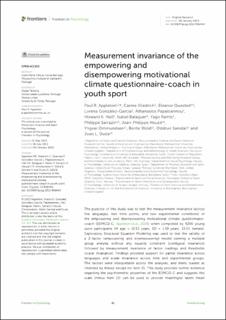| dc.contributor.author | Appleton, Paul R | |
| dc.contributor.author | Viladrich, Carme | |
| dc.contributor.author | Quested, Eleanor | |
| dc.contributor.author | González-García, Lorena | |
| dc.contributor.author | Papaionnaou, Athanasios | |
| dc.contributor.author | Hall, Howard | |
| dc.contributor.author | Balaguer, Isabel | |
| dc.contributor.author | Ramis, Yago | |
| dc.contributor.author | Sarazzin, Philippe | |
| dc.contributor.author | Heuzé, Jean Philippe | |
| dc.contributor.author | Ommundsen, Yngvar | |
| dc.contributor.author | Wold, Bente | |
| dc.contributor.author | Samdal, Oddrun | |
| dc.contributor.author | Duda, Joan | |
| dc.date.accessioned | 2023-05-05T07:36:52Z | |
| dc.date.available | 2023-05-05T07:36:52Z | |
| dc.date.created | 2023-01-13T14:40:29Z | |
| dc.date.issued | 2023-01-06 | |
| dc.identifier.issn | 1664-1078 | |
| dc.identifier.uri | https://hdl.handle.net/11250/3066351 | |
| dc.description.abstract | The purpose of this study was to test the measurement invariance (across five languages, two time points, and two experimental conditions) of the empowering and disempowering motivational climate questionnairecoach (EDMCQ-C; Appleton et al., 2016) when completed by 9256 young sport participants (M age = 11.53 years, SD = 1.39 years; 13.5% female). Exploratory Structural Equation Modeling was used to test the validity of a 2-factor (empowering and disempowering) model running a multiple group analysis without any equality constraint (configural invariance) followed by measurement invariance of factor loadings and thresholds (scalar invariance). Findings provided support for partial invariance across languages and scalar invariance across time and experimental groups. The factors were interpretable across the analyses, and items loaded as intended by theory except for item 15. This study provides further evidence regarding the psychometric properties of the EDMCQ-C and suggests this scale (minus item 15) can be used to provide meaningful latent mean comparisons (Marsh et al., 2013) of empowering and disempowering coachcreated climates across athletes speaking the five targeted languages, across time, and across experimental groups. | en_US |
| dc.language.iso | eng | en_US |
| dc.publisher | Frontiers | en_US |
| dc.rights | Navngivelse 4.0 Internasjonal | * |
| dc.rights.uri | http://creativecommons.org/licenses/by/4.0/deed.no | * |
| dc.subject | Kommunikasjon, trener og utøver | en_US |
| dc.subject | Communication, coach and athlete | en_US |
| dc.title | Measurement invariance of the empowering and disempowering motivational climate questionnaire-coach in youth sport | en_US |
| dc.type | Journal article | en_US |
| dc.type | Peer reviewed | en_US |
| dc.description.version | publishedVersion | en_US |
| dc.rights.holder | Copyright 2023 the authors | en_US |
| dc.source.articlenumber | 958444 | en_US |
| cristin.ispublished | true | |
| cristin.fulltext | original | |
| cristin.qualitycode | 1 | |
| dc.identifier.doi | 10.3389/fpsyg.2022.958444 | |
| dc.identifier.cristin | 2106694 | |
| dc.source.journal | Frontiers in Psychology | en_US |
| dc.relation.project | EC/FP7/223600 | en_US |
| dc.subject.nsi | VDP::Idrettspedagogikk og -psykologi: 333 | en_US |
| dc.subject.nsi | VDP::Physical education and sport psychology: 333 | en_US |
| dc.identifier.citation | Frontiers in Psychology. 2023, 13, 958444. | en_US |
| dc.source.volume | 13 | en_US |

